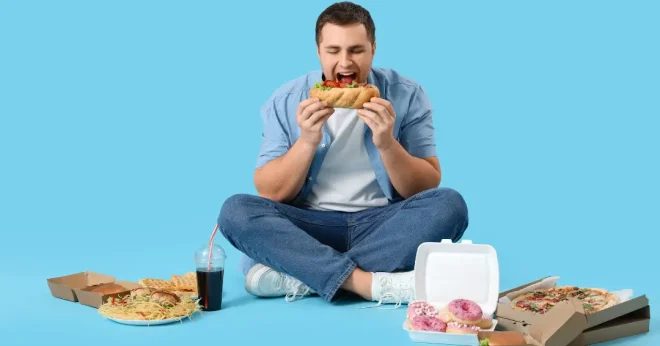
Steps to Stop Binge Eating
Eating too much can get the best of us. Evenings, during social events, dinner and cocktails… Choose your vice. We’ve all had it. That feeling of being out of control, being physically empty, without giving in to your cravings, and overall feelings of failure when you feel like you’ve let yourself, and your diet down.
What really causes binge eating?
Overeating is a result of coping with negative emotions. The process of compulsive overeating also applies to people with addictions to food, drugs, and even shopping addictions.
These negative emotions have 3 categories:
- Psychological factors – stress or anxiety etc.
- Chemicals – When we eat foods high in sugar and fat, chemicals such as oxytocin are released in our brain.
- Culture – The people around you and the culture you live in pressure you to eat more.
Binge eating can be caused by any of these reasons, so there is no single solution.

Steps to Stop Binge Eating
1. Start by listening to your body
When we inhale slowly, exhale, and focus on our body, we activate our parasympathetic nervous system (also known as the relaxation and digestive system). By doing this, we can separate the animal brain and desires from the prefrontal cortex, helping us make better decisions. It is also why studies show that meditation, yoga and mindful eating are great for people who binge eat. Slowing down, chewing your food 20 times before swallowing, and not eating while watching TV or playing on the phone are ways to become a healthier person. If you don’t like yoga or meditation, try this…Allow feelings and desire for junk food, get to know them and say hi.
Don’t try to fight them and don’t give up. Just acknowledge how you feel and think about why you feel that way.
Ask yourself these questions:
- Why do I want to eat this?
- Am I really hungry? Am I bored?
- How will I feel after eating this food?
- Will I regret it immediately?
Then give yourself an hour to wait. If you still want it after an hour, maybe you can give in.
2. Discover Patterns With a Journal
We all do triggers that can lead us to binge eat. It could be a particular restaurant you visit, friends you hang out with, or any time you go on vacation.
By writing down your thoughts and taking steps yourself that lead to emotional eating, you will become more aware of what is going on.
Keeping a journal and food logs has been shown to help dieters lose weight faster and avoid gaining weight.
3. Master the salad question
This is one of my favorites, it is both extremely helpful and infuriating.
It is important for you to decide whether you are truly hungry or just want to eat out of boredom. Rather, eat broccoli or an apple if it’s helpful.

4. Watch out for the “what the hell” effect
This is a real psychological phenomenon, the slightest mistake while eating will cause people to say “Oh my God!” and eat everything that comes your way.
This overeating often leads to great feelings of shame and guilt afterwards.
It is also often associated with bulimia, where the feelings of shame and guilt are so great that the person subsequently feels the need to purge their body.
In this case, your mental health is more at risk than your general health. Keeping distractions and temptations away will help you combat this. Keep perishable foods away from your home. Don’t go grocery shopping when you’re hungry. Self-talk can also be effective if you overeat.
Say something like: “Every little bit counts, so I shouldn’t eat now.” Every calorie you don’t eat is a calorie saved.
5. Be a vegetarian monster
Steamed vegetables help heal leaky gut.
Depriving oneself on a diet can lead to overeating. But the thing is, most vegetables are so low in calories that it’s easy to overeat when eaten in their natural state (so sliced vegetables don’t count). Eat plants, especially green leafy vegetables like there is no tomorrow and do not limit yourself. You can eat as much salad as you want without feeling guilty.
If all else fails, ask for help
Going back to the first thing I did, everyone’s a little different. Some people’s brains are vulnerable to addiction. If you have had a problem with overeating in your life and none of the methods I just explained worked, it means it is time to get professional help.
